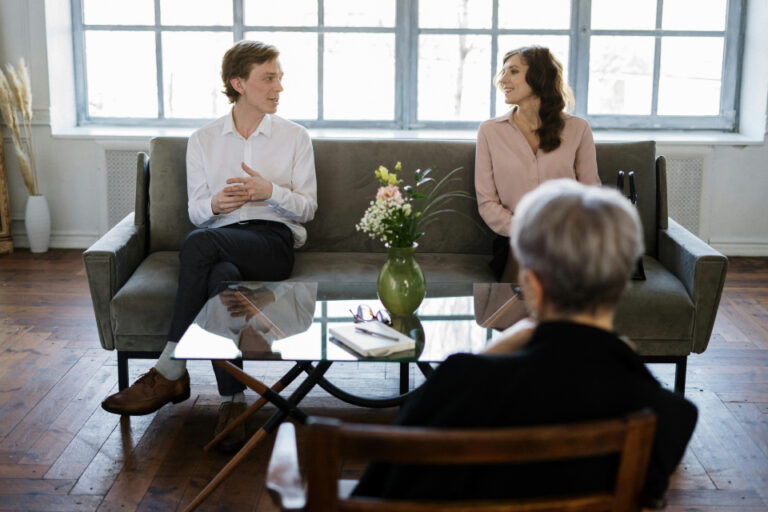Introduction to Relationship Counselling sessions
Relationship counselling, often interchangeably used with terms like couples therapy and marriage counselling, serves as a guided exploration of the dynamics, challenges, and aspirations within a partnership.
This form of therapy is not just a remedy for troubled relationships but also a proactive approach to strengthening bonds before significant issues arise.
Understanding Relationship Counselling
At its core, relationship counselling aims to improve communication, resolve conflicts, and foster a healthier emotional connection between partners.
Through the guidance of a professional counsellor, couples embark on a journey to understand both their individual and collective needs, addressing anything from minor disagreements to deep-rooted issues.
Counsellors employ a variety of methods tailored to the couple’s specific situation, including dialogue facilitation, empathy training, and exercises to improve understanding and intimacy.
The Importance of Knowing What to Expect
Setting Realistic Goals: Understanding the counselling process helps set realistic expectations, allowing couples to measure progress and appreciate the value of gradual improvement.
Preparation: Being informed about the structure of sessions and potential topics can reduce anxiety, making partners more open and engaged in the process.
Commitment to the Process: Knowing what to expect reinforces the commitment required from both partners. It emphasizes that while the counsellor guides and facilitates, the real work is done by the couple, both within and outside the counselling sessions.
Relationship counselling offers a valuable space for couples to address their concerns and grow together.
A clear understanding of what to expect can significantly enhance the effectiveness of this therapeutic journey, leading to more meaningful and lasting changes in the relationship.
The Role of a Relationship Counsellor
Relationship counsellors serve as neutral facilitators in the journey of relationship improvement. Their approach is multi-faceted, focusing on enhancing communication, understanding, and mutual respect within the partnership.
Responsibilities of Relationship Counsellors
Facilitating Change: The primary role of a counsellor is to facilitate positive change, guiding couples from their current challenges to a more fulfilling and understanding relationship.
Improving Communication: Counsellors assist couples in learning effective ways to listen and speak to each other, moving beyond patterns of shouting or talking at one another to meaningful dialogue.
Maintaining Neutrality: A key responsibility is to remain neutral and non-judgmental, ensuring that the counsellor does not impose personal views or solutions but supports the couple in finding what works best for them.
Supporting Decisions: Whether a couple decides to stay together or part ways, the counsellor’s role includes offering support and exploring potential issues that may arise from their decision.
Addressing Individual and Collective Issues: Counsellors look into how relationship dynamics affect each partner individually and the partnership as a whole, helping to resolve or accept differences.
How Counsellors Assist Couples
Identifying Underlying Issues: They help couples uncover the root causes of their problems, which often lie beneath the surface of arguments and dissatisfaction.
Facilitating Communication: By teaching couples how to express their needs and feelings clearly and respectfully, counsellors improve mutual understanding.
Conflict Resolution: Through guidance, couples learn to resolve conflicts constructively, without damaging the relationship’s foundation.
Encouraging Personal Responsibility: Counsellors encourage partners to take accountability for their actions and behaviors, emphasizing how individual change can benefit the relationship.
Offering Practical Solutions: They provide strategies and exercises designed to address common relationship challenges, from daily irritations to deep-seated issues.
Support and Guidance: In times of crisis or decision-making, counsellors offer the support and objective guidance needed to navigate through tough periods.
In essence, relationship counsellors are not just problem-solvers but also educators and supporters, teaching couples the skills needed for a healthy relationship and supporting them through the complexities of change.
Their ultimate goal is to help partners build a stronger, more satisfying relationship, regardless of the outcome.

Preparing for Your First Counselling Session
Starting your relationship counselling journey requires both mental and emotional readiness. Here’s how to prepare for that pivotal first session:
Mentally and Emotionally Preparing Yourself
Congratulate Yourself: Recognize your bravery in seeking help. This initial step is commendable and a sign of strength, not weakness.
Know Your “Why”: Reflect on your reasons for seeking therapy. Understand your goals, the issues you wish to address, and how you hope to feel at the end of the process. Writing these down can provide clarity and focus.
Consider a Pre-Session Consultation: A brief phone consultation with your counsellor or psychologist can alleviate any initial anxiety, answer your questions, and set the tone for your therapeutic journey.
Open Communication: If comfortable, inform a trusted friend or family member about your decision to attend counselling. Their support can be invaluable as you navigate through this process.
Review Your Life History: Reflect on how your personal and family history may impact your current situation. Understanding these influences can offer significant insights during therapy.
Relax: Give yourself permission to not have all the answers as listed above, you can work with your counsellor to work out the relationship issues you are facing.
Information to Bring to Your First Session
Information that will be useful and give you a good starting point – is to think about what you would like to achieve from attending relationship counselling sessions. You will engage in deeply personal work and having some idea of the dysfunctional patterns youengaging will help provide a starting point to the gradual process to managing conflicts.
List of Topics: Prepare a list of issues or topics you’d like to explore in your therapy sessions. This list can serve as a roadmap for your counselling journey.
Therapy Goals: Bring a written outline of what you hope to achieve through counselling. Even broad goals can help guide the therapeutic process.
Questions for Your Counsellor: Jot down any questions you have for your counsellor or psychologist about the therapy process, their approach, or what to expect in terms of progress and outcomes.
Personal Background Information: Consider sharing relevant aspects of your personal history, including any family dynamics, significant life events, or previous experiences with therapy.
Practical Concerns: Ensure you have clarified any logistical details with the counsellor’s office, or online information. Consider session frequency, cost, and cancellation policies.
Additional Tips
Dress for Comfort: Choose attire that makes you feel comfortable and at ease, as you want to be fully present, not distracted by discomfort.
Clear Space Around Your Appointment: If possible, allow yourself some quiet time before and after the session for reflection and to ease any potential stress.
Embrace the Process: Remember that therapy is a space for exploration and growth. There’s no right or wrong way to feel or express yourself. Be open to the experience and trust in your counsellor or psychologist’s guidance.
Taking these steps to prepare for your first relationship counselling session can help make the experience more meaningful and productive. It’s about setting the stage for open dialogue, personal growth, and ultimately, a stronger relationship.

The First Session: What to Expect
The initial session of relationship counselling is foundational, setting the tone for the therapeutic process. It’s a time for both partners and the counsellor to lay the groundwork for future work.
Understanding the structure and objectives can significantly reduce apprehension and prepare couples for what lies ahead.
Structure of the Session
Introduction to Counselling Policies: The counsellor will outline the session’s structure, including confidentiality, cancellation policies, and their therapeutic approach.
History of the Relationship: Couples are encouraged to share their story – how they met, what drew them together, and the journey that has led them to counselling.
Identification of Issues: The counsellor will inquire about past and present challenges within the relationship, seeking to understand their duration and impact.
Exploration of Previous Solutions: Understanding what the couple has tried in the past to address their issues helps the counsellor gauge their resilience and creativity.
Setting Expectations: Discussing what each partner hopes to achieve through counselling establishes clear goals and helps the counsellor tailor their approach.
Discussing Relationship Issues and Goals
Open Dialogue: A key part of the session involves creating a safe space for both partners to voice their concerns, fears, and desires openly and without judgment. This may include discussing issues with your counsellor individually.
Understanding Individual Perspectives: The counsellor will strive to understand how each partner perceives the relationship’s issues, recognizing that differing views are common and need to be bridged.
Goal Setting: Together, the couple and the counsellor identify specific, achievable goals for therapy, whether improving communication, resolving conflicts, or enhancing intimacy.
Learning New Skills: From the outset, the counsellor will begin to introduce concepts and skills that the couple can use to improve their relationship. This may include active listening, expressing needs clearly, and managing disagreements constructively.
Building Trust and Comfort
Establishing Rapport: The initial session is also about building a trusting relationship with the counsellor, ensuring that both partners feel heard and respected.
Confidentiality Assurance: Reiterating the confidentiality of the counselling process helps partners feel safe to share deeply personal and sensitive information.
Encouragement of Honesty: The counsellor will emphasize the importance of honesty and openness throughout the therapy process, which is crucial for meaningful progress.
The first session of couples counselling is as much about building a foundation of trust and understanding as it is about discussing the issues at hand.
By creating a structured yet flexible environment, the counsellor facilitates a space where both partners can begin to explore their relationship dynamics, articulate their feelings, and set realistic goals for improvement. This initial meeting is the first step on the journey towards a healthier, more fulfilling relationship.

Common Techniques Used in Counselling
Relationship counselling employs various techniques to help couples navigate their issues and improve their relationship dynamics. One of the most effective approaches is Emotionally Focused Therapy (EFT), among others, which have been developed to address specific relationship problems.
Emotionally Focused Therapy (EFT)
Foundation: EFT is based on the premise that emotions can be used as a source of healing in relationships. It focuses on creating and strengthening secure emotional bonds between partners.
Process: The therapy involves three main stages – de-escalation of negative cycles, changing interaction patterns, and consolidation of new patterns and bonding experiences.
Attachment Theory: EFT is rooted in attachment theory, suggesting that adults have attachment needs that are as important as those of infants.
Emphasis on Emotion: By emphasizing emotional expression and the recognition of patterns that lead to distress, couples can understand and improve their emotional availability and responsiveness.
How Techniques Address Relationship Problems
Breaking Negative Cycles: Techniques like EFT help couples identify and break patterns of negative interactions, such as criticism, defensiveness, and withdrawal, that perpetuate conflict and distance.
Improving Communication: By focusing on emotions and underlying needs, couples learn to communicate more effectively, expressing themselves in ways that invite empathy and understanding rather than conflict.
Enhancing Emotional Connection: Techniques aim to foster a deeper emotional connection between partners by encouraging the expression of vulnerabilities and needs, leading to stronger bonds.
Resolving Conflicts: With a better understanding of each other’s emotional triggers and patterns, couples can navigate conflicts more constructively, finding resolutions that respect both partners’ needs.
Building Resilience: Through the therapeutic process, couples develop skills and resilience that enable them to deal with future challenges more effectively, reducing the likelihood of falling back into detrimental patterns.
Each of these techniques addresses different facets of relationship problems, from communication breakdowns and emotional disconnection to cycles of negative interactions.
By tailoring the approach to the couple’s specific needs and dynamics, relationship counsellors can help partners build a more satisfying, healthy, and resilient relationship.

Handling Sensitive Topics
Addressing personal issues and understanding each partner’s family history are important aspects of relationship counselling. These elements significantly influence how individuals behave and interact within their relationships.
Approaching Personal Issues
Identifying Underlying Issues: Counsellors help couples identify personal issues affecting the relationship, including individual stressors, mental health challenges, and past traumas.
Creating Space for Individual Exploration: While the focus is on the couple, individual sessions may be offered to explore personal issues deeply affecting the relationship.
Integrating Individual Healing: Techniques are employed to ensure that individual healing is integrated into the process of improving the relationship, acknowledging that personal wellbeing is essential for a healthy partnership.
Understanding Family History
Mapping Family Dynamics: Counsellors assist couples in exploring their family histories to understand the impact of past dynamics on current relationship patterns.
Identifying Inherited Patterns: Recognizing and addressing patterns inherited from family of origin can help partners understand their reactions and behaviors in the relationship.
Differentiating Past from Present: Couples are guided to differentiate between past family dynamics and their current relationship, helping to break cycles of negative interactions.
Nurturing Growth and Understanding
Highlighting Strengths: The counsellor highlights the couple’s strengths and positive aspects of their relationship, promoting a sense of partnership and teamwork.
Promoting Self-Reflection: Partners are encouraged to engage in self-reflection to better understand their contributions to relationship dynamics and how they can initiate positive changes.
Supporting Through Challenges
Navigating Difficult Conversations: The counsellor provides support and guidance in navigating difficult conversations, ensuring that both partners feel supported and understood.
Resilience Building: Strategies are introduced to help couples build resilience, enabling them to face future challenges more effectively.
Relationship counselling involves a delicate balance of addressing personal issues, understanding the impact of family history, and maintaining a supportive environment that fosters open communication, empathy, and growth.
Through this comprehensive approach, couples can work towards resolving their issues and building a stronger, more resilient relationship.

The Role of Individual Sessions
While relationship counselling primarily focuses on the dynamics between partners, there are instances when individual therapy is recommended as a complement to the couple’s therapy. Understanding when and why this step is advised can help partners navigate their journey towards a healthier relationship more effectively.
When Individual Therapy May Be Recommended
Personal Issues Impacting the Relationship: When one partner’s personal issues, such as past trauma, mental health challenges, or unresolved grief, significantly impact the relationship.
Different Stages of Readiness: If one partner is not yet ready or able to engage in couples therapy effectively, individual sessions can provide a space to work on personal readiness.
Development of Personal Insight and Growth: Individual therapy can help partners gain deeper insights into their own behaviors, patterns, and emotional responses that contribute to relationship dynamics.
Why Individual Therapy Is Recommended
Addressing Personal Challenges: To provide a safe space for individuals to address personal challenges that are difficult to explore in couples sessions.
Enhancing Self-Awareness: To increase self-awareness and self-reflection, essential components for personal growth and healthy relationships.
Improving Emotional Regulation: To develop better emotional regulation skills, leading to more constructive interactions with the partner.
Achieving a balance between individual needs and relationship goals is crucial for the health and longevity of the partnership. This balance ensures that both partners feel fulfilled individually while working towards a stronger, more connected relationship.
Navigating Conflicts Arising from Individual Needs
Conflict Resolution Strategies: Implementing strategies for resolving conflicts that arise from differing individual needs, ensuring that solutions are equitable and respect both partners’ needs.
Compromise and Flexibility: Cultivating a spirit of compromise and flexibility, recognizing that balancing individual needs with relationship goals sometimes requires adjustments and concessions from both partners.
Reinforcing the Partnership
Mutual Support System: Building a strong support system within the relationship, where partners feel encouraged and uplifted in their individual pursuits.
Celebrating Individual Achievements: Celebrating each other’s achievements and milestones as a way of reinforcing the partnership and deepening the connection between partners.
Balancing individual needs with relationship goals is a dynamic and ongoing process that requires communication, understanding, and compromise. By addressing personal issues through individual therapy when necessary and working towards integrating individual growth into the fabric of the relationship, couples can create a stronger, more fulfilling partnership.
Expectations vs. Reality
Relationship counselling, like many therapeutic processes, is surrounded by misconceptions that can deter couples from seeking the help they need. Addressing these myths is crucial for understanding the true nature and benefits of counselling.
Misconception: Counselling is Only for Failing Relationships: Many believe counselling is a last resort for relationships on the brink of collapse. In reality, counselling can be beneficial at any stage, serving as a preventive measure or a tool for strengthening bonds.
Misconception: The Counsellor Will Take Sides: Some fear that the counsellor will favor one partner over the other. However, counsellors are trained to remain neutral and support the relationship, not individual partners.
Misconception: Immediate Results: Another common myth is expecting immediate solutions and transformations. Counselling is a process that involves gradual changes and efforts from both partners.
Misconception: Counselling is About Assigning Blame: People often worry that counselling will focus on blaming one partner for the relationship’s issues. Instead, the focus is on understanding patterns, behaviors, and solutions collaboratively.
Realistic Expectations for Progress and Outcomes
Setting realistic expectations for counselling is essential for a productive therapeutic journey. Understanding what counselling can realistically offer helps couples approach the process with an open mind and readiness to engage.
Expectation: Process Over Outcomes: Recognize that counselling is more about engaging in a process of growth and understanding rather than achieving a predefined outcome. Progress is measured in insights, communication improvements, and emotional connection.
Expectation: Effort is Required from Both Partners: Successful counselling requires active participation and effort from both partners. Change happens both within the sessions and in how partners interact with each other in their daily lives.
Expectation: Ups and Downs Are Part of the Process: Progress in counselling is not linear. There will be moments of breakthrough and periods of stagnation or even regression. These fluctuations are normal and part of the journey towards a healthier relationship.
Expectation: Long-term Commitment: While some improvements can be noticed relatively early, deep and lasting changes often require a long-term commitment to the counselling process and to continuous work on the relationship.
Understanding these misconceptions and setting realistic expectations can greatly enhance a couple’s counselling experience, paving the way for meaningful and lasting improvements in their relationship.
Conclusion
Embracing this support can be a pivotal step toward nurturing a healthier, more joyful relationship.
The Importance of Relationship Counselling
Foundational Support: Relationship counselling provides a foundational support system for couples at any stage, whether they are facing specific challenges or simply wish to deepen their connection.
Improved Communication: It offers tools and strategies for improving communication, ensuring that both partners feel heard, understood, and valued.
Conflict Resolution: Counselling equips couples with the skills to manage and resolve conflicts constructively, turning potential stumbling blocks into opportunities for growth.
Emotional Connection: By focusing on emotional intimacy, counselling helps couples rediscover their bond, fostering a stronger, more resilient partnership.
Personal Growth: Beyond the relationship itself, counselling encourages individual self-awareness and growth, contributing to the overall health of the partnership.
Encouragement to Seek Help
A Proactive Step: Seeking counselling should be viewed as a proactive step towards a happier, more fulfilling life together. It’s an investment in the future of your relationship.
Strength, Not Weakness: Recognizing the need for support and choosing to seek help is a sign of strength and commitment to each other and to the quality of your life together.
Accessible Support: With more options than ever, including traditional in-person sessions and online counselling, support is accessible to all couples, regardless of their location or situation.
A Journey Together: Embarking on the counselling journey is a shared experience that can bring couples closer, helping them to build a partnership based on mutual understanding, respect, and love.
In summary, relationship counselling provides hope and a path to enrichment for couples at all stages of their journey together. It is a courageous choice that highlights the desire for a deeper, more connected, and happier life together. Let this be your invitation to explore the possibilities that counselling can offer, knowing that seeking help is an act of love for yourself and your partner.



